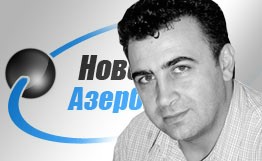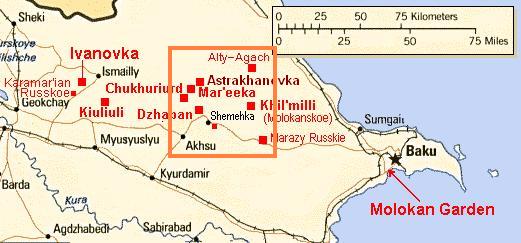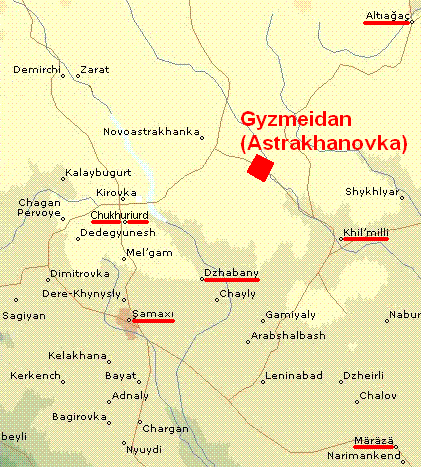
|
Agency for international
information
"AZERBAIDZHAN-NEWS"
International
news
agency "Azerbaijan-News"
|
Последний из молокан
|
Last of the Molokane
|
Путешествие
в
Астрахановку
Аналитика
07/ 03/ 2007
Адалят Мадатоглу
(Баку–Шамаха–Гызмейданы–Баку) |

|
A
trip to Astrakhovka
Investigative
March 7, 2007
By Adaliat Madatoglu
(Baku-Shamakha-Gyzmeidany-Baku)
|
|
БАКУ, 7 марта –
«Новости-Азербайджан». Совет политологам: процесс
исследования уровня экономического и политического развития
той или иной страны необходимо начинать с посещения
населенных пунктов, где проживают этнические меньшинства.
Социальное положение этнических меньшинств наиболее ярко
отражает ситуацию в стране.
|
BAKU, March 7, 2007 —
"Azerbaijan News". Advice to political scientists: the
process of investigating the level of the economic and
political development of one or another country must start
with a visit of the populated areas, where the ethnic
minorities live. The social position of ethnic minorities
most vividly reflects the situation in a country. |
| Чтобы, например, уяснить для
себя, какая из держав сильнее, – США или Россия, нет нужды
прибегать к статистическим данным или подсчету экономических
показателей. Следует просто сравнить, как проживают народы
Севера, – эскимосы, тунгусы и прочие – в Соединенных Штатах
и России. Это очень эффективный метод. Вот почему после
того, как президент Азербайджана Ильхам Алиев отправился из
Шамахы в Габалинский район, я, прежде чем попрощаться с
родиной Сабира и вернуться в Баку, обратился к своему
попутчику-шамахинцу с просьбой указать нам путь в селение,
где проживают молокане. Он порекомендовал мне отправиться в
Гызмейданы – «Девичью площадь». Раньше село называлось
Астрахановка. |
For example, to decide which
of the powers is stronger, the USA or Russia, there is no
need to rush to statistical data or a table of economic
indices. One should simply compare how the northern tribes
live — Eskimos, Evenks [Tunguses]
and others — in the United States and Russia. This is a very
effective method. This is why after the President of
Azerbaijan Ilham
Aliyev left Shamakha
in the Gabalinskiy region, I was recruited from my homeland
in Sabir
to return to Baku. I joined a fellow-traveller to Shamakha
assigned to go into a village where Molokane live. It was
recommended that I go to Gyzmeidan — "Divich'iu ploschad'"
["Girl's square", probably the town center]. Earlier the
village was called Astrakhanovka.
[Click on images to
enlarge]
|

Молоканские поселения в северном Азербайджане.
Molokan villages in north Azerbaidjan.
|

|
| Признаюсь, молокан я выбрал
не только потому, что они – представители национального,
более того, конфессионального меньшинства, но еще и потому,
что храню в себе добрые воспоминания об этих смелых,
трудолюбивых людях, в соседстве с которыми я рос и прожил
полжизни в Грузии… |
I admit that I selected the Molokane not only
because they are representatives of a nationality,
especially a religious minority, but I still have many
memories about these daring, industrious people, who lived
near where I grew up and lived half my life in Georgia...
|
| Проехав
насквозь Шамаху, которая все еще блестела после
посещения города президентом, свернули направо.
Проехали через новый
мост над рекой Пирсаат, хотя рекой это вялое
течение разрозненных ручейков вряд ли можно назвать. |

|
After
passing right through Shamakha,
which still sparkled after the President visited the
city, we turned to the right. We drove across the new
bridge above the river Pirsaat, though the
slow flowing streams can hardly be called a river. |
|
Новый мост остался позади,
поднимаемся по дороге, которая, по всей видимости, недавно
засыпана и утрамбована гравием. Земля в этих местах
жирная, рыхлая, красного цвета, а так как уже начали таять
снега, то если бы не гравий, в такую пору вряд ли можно было
бы доехать до села на легковушке. В этом мы убедились позже
– гравий был засыпан не до конца, и небольшой отрезок дороги
машина преодолела с большими трудностями, скользила в жирной
грязи и заставляла водителя нервничать. Тем не менее все
окончилось благополучно, если не считать того, что
автомобиль наш стал напоминать машины, которые участвуют в
ралли Париж–Дакар. Прежде чем заехать в деревню,
остановились на возвышенности, около вышки «Азерсель».
Окинули взором панораму бывшей Астрахановки, сделали пару
снимков, попытались позвонить в Баку, не удалось – вышка
стоит, но телефоны не ловят.
|
We passed the new bridge and
rose along the road, which seemed to be recently filled and
graded with gravel. The local soil is rich, porous, and red
colored. If not for the gravel, it would be barely possible
at this time to get to the village by car because the snow
had already begun to melt. We learned later that the gravel
was not laid to the end of the road, and the car went
through a small section of road with great difficulty. It
slid in thick mud and made the driver nervous. We got
through anyway, even though we did not expect the car we
started with to be like those in the Dakar
Rally. Before dropping into the village, we stopped at
a view point, near an "Azersel'" cell phone tower. They
glanced at the panorama of former Astrakhanovka, took a few
of photos, attempted to phone Baku with no success. The
tower stands, but the mobile telephones do not connect. |
Селение аккуратное, бросается
в глаза строгая планировка. Стены почти всех домов – белые,
за исключением большой школы в центре села, которая
выкрашена в желтый цвет.
|
The village layout was
precise, indicating strict planning. The walls of almost all
houses are white, except a large school located in the
center which was painted yellow. |
Заезжаем. Грязь еще не
подсохла. Очень чистый воздух и тишина. Хорошая мягкая вода
из крана, который установлен на одной из улиц.
|
We arrived. The mud had not
dried. The air was very pure and silent. There was good soft
water from the [community] faucets installed on one of the
streets. |
Разминаем ноги. И медленной
походкой идем вверх по улочке. Первый наш собеседник –
молодой парень – Мансур. Говорит на ломаном азербайджанском
языке. – Ты кто по национальности? – задаю ему свой
неделикатный вопрос. – Узбек я, – отвечает он. – В прошлом
году приехал из Узбекистана, жена у меня из турок-ахыска
[турков-месхетинцев].
|
We stretched our legs. And
strolled up the street. Our first contact [collocutor] was
a young fellow, Mansur. He speaks a broken Azerbaijani
language. "Who are you by nationality?" I asked him an
indelicate question. I am Uzbek, he answers. I arrived a
year ago from Uzbekistan, my wife is Meskhetian
Turk. |
| – А молокане в селе есть? |
[Reporter] "Are there any Molokane in the
village?" |
– Мало. Очень мало, – говорит
Мансур и продолжает. – Молокан мало, но есть азербайджанцы, гразы
и еразы, – вот так он обрисовал нам этнический состав
села. Будучи узбеком, он, наверное, еще не знает смысла этих
терминов. Не его вина, – что слышал, к чему привык, то и
говорит. Продолжаем свой путь и мирно беседуем. На
лавке перед домом сидят трое мужиков. Здороваюсь.
|
"A few, very few," said
Mansur; and he continued, "the Molokane are few but so are are the
Azerbaijani, grazy
and
erazy [Slang:
Azeri refugees from Georgia and Armenia.]". That's
how he depicted the ethnic composition of village to us.
Being an Uzbek, he probably yet does not know the sense of
these terms. It's not his fault that he got in the habit of
repeating what he heard. We continue on our way and
peacefully chatted, three guys siting on a bench in front of
a house, passing the time of day.
|
| – Молокане? |
"The Molokane?" |
– Да.
|
"Yes." |
– Ну, как вам живется?
|
"Well, how are they?" |
– Да вот, живем кое-как.
|
"Here but not well [poor]." |
Знакомимся. Все троих зовут
Николаями, первый – с бородой – Николай Николаевич
Белогуров, второй – тоже Николай Николаевич, но Богданов,
третий – Николай Иванович Уклеин. Пенсионеры. Белогурову –
77 лет. Озвучили две жалобы: электричество иногда прерывают
и вторая – пенсии маловато, треть суммы уходит на мешок
муки. Работы нет. Газа нет. Отапливают русские печки
дровами.
|
We become acquainted. The
names of the three are (1) Nikolai with a beard; Nikolai
Nikolaievich Belogurov,
(2) also Nikolai Nikolayevich but Bogdanov; and (3) Nikolai Ivanovich Uklein. They are all
retired. Belogurov is 77 years old. They had two complaints:
(1) electricity is sometimes interrupted, and (2)
pensions are not enough, a bag of flour cost 1/3 their
monthly income. There is no work. There is no gas. They heat
their Russian stoves with firewood.
|
– Где их берете?
|
"What irritates them?" |
– У меня мотоцикл, – сообщает
Николай Иванович. – Я по дрова на нем езжу, кустарники
срезаю.
|
"I have a motorcycle,"
reports Nikolai Ivanovich. "I use it to get firewood,
a bit primitive." |
– Машина дров стоит 100
манатов, – вмешивается в разговор Мансур, у которого нет
мотоцикла.
|
"A load of of firewood costs
100 manat
[~$109, March 2007], it interferes in the conversation
Mansur, who does not have a motorcycle.
|
– Раньше жили хорошо. Был
совхоз «Коммунизм», я работал монтёром, жизнь кипела,
зарплаты хватало. А теперь пришло время – сына достойно в
школу отправить не могу, – сетует Николай Иванович.
|
"Earlier they lived well.
There was state farm named 'Communism'. I worked as an
electrician. Life was rich, and pay was good. But now a time
has come where I can't send my worthy son to school",
laments Nikolai Ivanovich. |
В отличие от Уклеина,
Белогуров не очень-то интересуется социальными проблемами.
Он все норовит ознакомить меня с историей Астрахановки и
показать видеокассету со съезда молокан, который прошел в
2005 году в [Кочубеесвское]
Ставрополье.
|
In contrast to Uklein,
Belogurov is not very interested in social problems. He only
intends to acquaint me with the history of Astrakhana and to
show a video cassette about the congress of the Molokane, which took
place in 2005 in [Kochubeevskoe]
Stavropol'. |
Рассказывает, что в одном из
домов молокане села время от времени собираются вместе и
совершают свои религиозные обряды.
|
He says, that they often
gather in one of the Molokan
houses in the village and perform their religious
rituals.
|
| – Много различий между вашими
религиозными обрядами и духоборами? |
"Are there many differences
between your religious rituals and the Doukhobors?" |
Мой вопрос Белогурову не
понравился, вижу по глазам.
|
I can see that Belogurov was
not pleased by my question.
|
– Духоборы – это совсем
другое, когда они поют обрядные песни, громко топают ногами…
|
"Doukhobors are entirely
different. When they sing ritual songs, they loudly stamp
their feet."[He is
probably is referring to Dukh-i-zhizniki or Pryguny, who he never saw.] |
Плавно меняю тему разговора,
чтобы ненароком не обидеть собеседников:
|
I inadvertently smoothly
changed the theme of the conversation in order to not offend
my company [collocutors]: |
– Сколько вас, молокан,
осталось в Гызмейданы?
|
"How many of you Molokans
remain in Gyzmeydan? |
– 47 человек (по версии
Белогурова), 70 – по мнению Уклеина.
|
"47 people (according to
Belogurova), 70 by Uklein's opinion.
|
Выяснилось, что история села
насчитывает более 300 лет. В советские годы население здесь
составляло 450 человек. Сегодня домов, где проживают
молокане, осталось не более 20 – молодежь покидает эти
места.
|
They explained that the
history of the village counts goes back 300 years. During
Soviet times the population here was 450. Today Molokane live in not
more than 20 houses, because the young people leave these
kind of places. |
| – Куда в основном уезжают? |
"Basically where do they
leave to? |
– В Баку или на Ставрополье,
в Шпаковский район, – отвечает Николай Николаевич Белогуров.
|
"To Baku or to Shpakovskii
region, Stavropol'," answers Nikolai Nikolayevich Belogurov.
|
Скоро, лет через 5–10,
молокан в этом селе не останется совсем. Потому что
количество надгробных камней на молоканском кладбище уже
превышает количество живых молокан села в десятки раз.
|
Soon, in 5-10 years, there
will be no Molokane in
this village at all. Therefore the count of headstones in
the Molokan cemetery
already exceeds the number living Molokane of village by tens [dozens] of
times. [Using the metric ystem, Russians don't count eggs by
12s, but by 10s.] |
– Когда были последние
похороны в селе?
|
"When was the last burial
[funeral] in the village?" |
Отвечают сразу: «Совсем
недавно».
|
They answer immediately:
"Very recently". |
| – А свадьба? |
"A wedding?"
|
Призадумываются, напрягают
память: «Года четыре назад»…
|
They hesitate in thought,
they strain their memory: "Four years ago ... " |
– Прощайте, – протягиваю им
руку и сажусь в машину.
|
"Excuse me", I extend my hand
to them and I sit down in the car.
|
| – Насчет пенсии ты
обязательно напиши, мука больно дорогая, – напоминает
Уклеин. |
"Promise to write about the
pension amounts and that flour is painfully expensive,"
reminds Uklein. |
– Напишу обязательно, –
обещаю я, и мы разворачиваем машину – скоро стемнеет,
надо возвращаться обратно. Автомобиль буксует в грязи, и это
доставляет огромное удовольствие Мусе и Мухеддину –
маленьким сыновьям Мансура. Пока водитель пытается выправить
машину на дороге, рассматриваю дома. Они – покосившиеся и
опустевшие – все еще сохраняют в себе следы былого благополучия. Едва
заметные узоры на оконных ставнях – как на обложке книги
«Русские сказки». Высохшие колодцы во дворах, старый
«Запорожец», приспособленный под курятник…
|
"I promise to write, I
promise, and we turn the car around. Soon it will be dark.
We need to go back The car skids in the mud, and this
provides enormous pleasure to the young sons of Mansura, Mus
and Mukheddin. While the driver attempts to straighten the
car on the road, I examine houses. They have become lopsided
and deserted, yet preserve signs of a bygone prosperity.
Designs on the window shutters are barely noticeable, as on
the cover of a book of "Russian fairy tales". Dried wells
are in the courtyards, and an old "Zaparozhets"
[smallest Russian car] is used as a chicken coop...
|
|
|
|
Spiritual Christians in Azerbaijan
Spiritual Christians
Around the World
|



